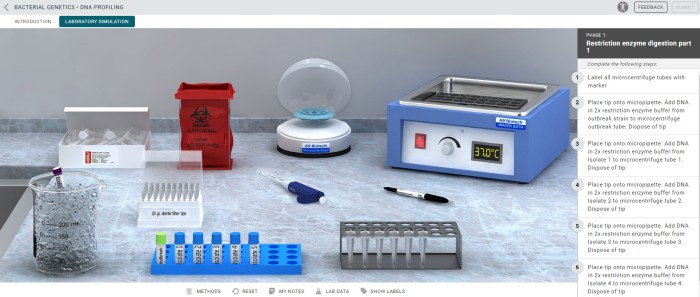Dna profiling virtual labs answer key – Delve into the realm of DNA profiling with our comprehensive virtual labs answer key, providing an immersive and interactive learning experience that empowers you to decipher the complexities of genetic identity. Through engaging simulations and expert guidance, you’ll master the techniques of DNA extraction, amplification, and analysis, unlocking the secrets hidden within the human genome.
Our virtual labs offer a safe and accessible platform to explore the practical applications of DNA profiling, from unraveling forensic puzzles to diagnosing genetic diseases. With our step-by-step instructions and interactive exercises, you’ll gain hands-on experience in interpreting DNA data, drawing meaningful conclusions, and understanding the ethical and legal implications of this powerful technology.
1. DNA Profiling Virtual Labs
Overview

DNA profiling is a technique used to analyze the genetic material of an individual. It involves extracting DNA from a sample, such as blood, saliva, or hair, and then analyzing the DNA sequence to identify specific genetic markers.
DNA profiling has a wide range of applications in various fields, including forensics, medicine, and genealogy.
Virtual labs provide a simulated environment for performing DNA profiling experiments. These labs offer several benefits, including reduced costs, increased safety, and the ability to repeat experiments multiple times without the need for physical resources. However, virtual labs also have limitations, such as the lack of hands-on experience and the potential for errors due to software limitations.
2. Virtual Lab Procedures and Techniques: Dna Profiling Virtual Labs Answer Key
Performing DNA profiling in a virtual lab typically involves the following steps:
- DNA extraction:Extracting DNA from the sample using virtual tools that simulate the chemical and physical processes of DNA extraction.
- DNA amplification:Amplifying the extracted DNA using virtual tools that simulate the polymerase chain reaction (PCR) technique to make millions of copies of the target DNA sequence.
- DNA analysis:Analyzing the amplified DNA using virtual tools that simulate electrophoresis or other techniques to separate and identify the different DNA fragments based on their size and charge.
Quality control measures are crucial in virtual lab experiments to ensure the accuracy and reliability of the results. These measures may include using positive and negative controls, repeating experiments, and verifying results through multiple methods.
3. Data Analysis and Interpretation

The data generated from DNA profiling experiments is analyzed using statistical techniques to identify patterns and draw conclusions. Common methods include:
- Allele frequency analysis:Determining the frequency of different alleles (variations of a gene) in a population.
- Hardy-Weinberg equilibrium:Testing whether a population is in genetic equilibrium, which can indicate random mating and the absence of evolutionary forces.
- Linkage analysis:Identifying the inheritance patterns of genes located close together on a chromosome.
DNA profiling data can be used to solve real-world problems, such as identifying individuals in forensic investigations, establishing paternity, and diagnosing genetic diseases.
4. Applications of DNA Profiling

DNA profiling has numerous applications in various fields:
- Forensics:Identifying individuals from crime scene evidence, such as blood or hair, and establishing relationships between suspects and victims.
- Medicine:Diagnosing genetic diseases, predicting disease risk, and developing personalized treatments.
- Genealogy:Tracing family history and relationships, and identifying genetic ancestry.
Case studies can illustrate the practical uses of DNA profiling, such as identifying victims of mass disasters, solving paternity disputes, and diagnosing rare genetic disorders.
5. Ethical and Legal Considerations

DNA profiling raises ethical and legal concerns:
- Privacy:Concerns about the potential misuse of DNA information, such as discrimination or identity theft.
- Informed consent:Ensuring that individuals understand the implications of DNA profiling before providing their samples.
- Regulation:The need for regulations and guidelines to govern the use of DNA profiling in different jurisdictions.
Ethical guidelines and legal frameworks are being developed to address these concerns and ensure the responsible use of DNA profiling.
Frequently Asked Questions
What is the purpose of DNA profiling?
DNA profiling allows for the identification of individuals, determination of genetic relationships, and diagnosis of genetic disorders.
How are virtual labs beneficial for DNA profiling?
Virtual labs provide a safe and cost-effective environment for learning and practicing DNA profiling techniques, allowing for repetitive experiments and minimizing the risk of contamination.
What are the ethical considerations in DNA profiling?
Ethical considerations include privacy concerns, potential misuse of genetic information, and the need for informed consent and regulation.
